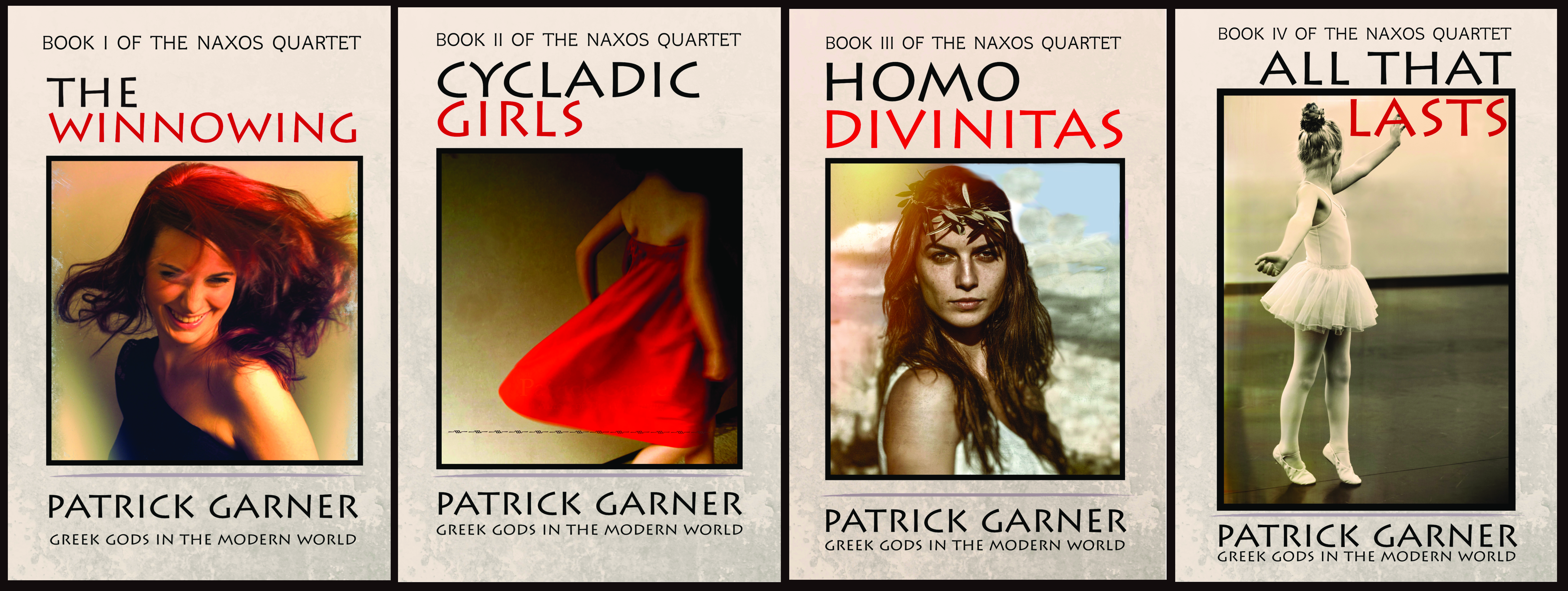
READER’S GUIDE
♛ ♛ ♛ ♛
The Naxos Quartet and Garner’s Greek Mythology podcasts contend that the ancient Greek gods were not myths at all, and are here, now, in our world. Patrick Garner writes in The Winnowing about what happens when the three Fates return to stop scientists from upending the balance of nature by conquering death.
He continues in Cycladic Girls with the transformation of a Greek nymph into the original Great Goddess. The story carries on in Homo Divinitas, where he explores the Great Goddess’ s return and its impacts on the young women who follow her. All That Lasts expands the story to involve all of humanity.
The Naxos Quartet is driven by strong women and a constantly changing plot line of deception, seduction, celebrity and love affairs.
The following questions and author’s comments are intended to enhance the experience of readers, bookclubs and reading groups.

THE WINNOWING
QUESTIONS
1. Some readers may find the narrator and protagonist Jack hard to like, especially since he seems to fall in love easily, even callously. Comment.
2. Given that Jack is under the control of divine forces, do you see an inner-decency? If so, how is it exhibited?
3. Who is the tragic figure in this story? Why?
4. Discuss how Gaia’s approach to life differs from our own.
AUTHOR’S COMMENTS
1. Although Jack warns the reader that events aren’t what they seem, even the idea of incest can be off-putting. Careful readers learn that Chloé is 19 years old, is not his daughter and is the seducer.
When Jack later appears to seamlessly move on to his next love interest, he can look downright cad-like. However, as he explains, neither he nor Chloé are in control of events. She’s not even human, and both have been set up by the Greek gods to further their audacious agenda.
2. Yes. Jack has put Chloé first since her birth, buying a country manor to give her a pleasant childhood and foregoing adult relationships after he finds they upset her. He has no choice in his reaction to Chloé’s “come on.” As the reader learns in the novel’s shocking climax, both are victims of Aphrodite and Eros (Cupid), against whom even the gods are defenseless.
3. For me the tragic figure is Chloé. She did not know who she really was until she was 19, and even then she was powerless to prevent events.
4. Gaia—as Nature—is amoral. There is no right or wrong. She does not pick favorites, as in “which species or individual lives, or which dies.”
The concept of morality is fascinating to me because it is mutable and always culture-based. Watching it on a large scale through Gaia is a useful reminder that what seems logical in one century seems astounding in the next.
______________________________
CYCLADIC GIRLS
QUESTIONS
1. Timessa faces a difficult journey as she transforms from a nymph under Artemis’ s protection into the Great Goddess. What do you think would have happened without Io?
2. Josef gave Timessa a lifeline when she needed it, and followed up by giving her an outrageously expensive gift. Yet even as she accepted the gift, she rejected him. Do you think she owed him an explanation?
3. Timessa reacts to contemporary world challenges as a goddess, not as a citizen who calls police for help. For example, she kills a free-lance photographer with the same nonchalance as she does ancient satyrs in France. Discuss.
AUTHOR’S COMMENTS
1. I think Timessa would have gotten out of control and demanded human sacrifices… and that would be just the beginning of her blood lust.
2. Josef is an interesting character in that he is much like many people in our lives—they are not necessarily pivotal to our decision-making—but they offer us learning opportunities.
3. Greek gods have never needed to answer to worldly authority.
______________________________
HOMO DIVINITAS
QUESTIONS
1. Timessa tries to protect her girls from pain. Should she?
2. How would her powers, once she fully grasps their extent, best be used?
3. What do you think happens next?
AUTHOR’S COMMENTS
1. This is another fascinating question. What do we want in life? Certainly not suffering. Is happiness worth having if getting it hurts? Must everyone travel a bumpy road?
2. Timessa spends a lot of time wrestling with that issue. There is no one correct answer as each of us has different ideals and goals, and our answer will inevitably be colored by our own experiences, instincts and education.
3. Timessa and Io return in Book IV! Get your copy of All That Lasts.
______________________________
ALL THAT LASTS
QUESTIONS
1. Why was Timessa transformed into the original Great Goddess who ruled 40,000 years ago?
2. Timessa was ripped from present-day Naxos to old Europe, seemingly at will by Gaia. She wrestles with the concept that time is not linear. What do you think?
3. Gaia appears to Timessa as a 9-year-old girl who practices ballet. Why?
4. What is Timessa’s revelation from her many trials?
AUTHOR’S COMMENTS
1. Gaia wants to see if Timessa can overcome the original Great Goddess’s failures. She grants Timessa immense powers, but must be assured that she is worthy of them. She doesn’t tell Timessa why she has infused her with her predecessor’s great powers and troubling memories — that is left for Timessa to determine. We are lucky that Timessa is basically good and has Io to smooth out the rough spots.
2. The concept of time continues to be explored by scientists and Hollywood alike.
3. Gaia appears to Timessa in a form she can understand — not as some giant, terrifying ancient deity, but as an adorable child.
4. Timessa finally understands that love is the basis of the universe and is expressed by belonging. Specifically, we intuit that the universe is love. We are part of the universe. Therefore, we have a right to be here; we belong.